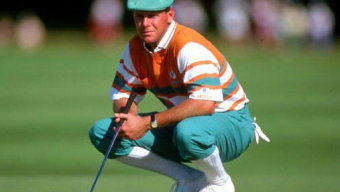PINEHURST, N.C. — Chelsea Stewart took one last look at the bronze statue of Bobby Jones and stepped to the podium.
“I had never seen this award before but I know my dad would have loved it because Bobby Jones can rock the knickers just like my dad did,” she said.
Such was the tone and tenor of the steamy southern afternoon when nearly 1,000 fans braved 95-degree heat to honor the memory of Payne Stewart as the USGA handed out its Bobby Jones Award.
The award is given annually to someone who demonstrates sportsmanship, character and respect for the game. This was the first public ceremony, and by all accounts it was a success.
Among those attending the festivities, held on the lawn bowling grounds in front of the Pinehurst clubhouse, was PGA Tour Commissioner Tim Finchem. The Tour honors the legacy of the three-time major winner by handing out the Payne Stewart Award presented by Southern Company each fall.
The crowd was so large that Ben Crenshaw and Bill Coore, who oversaw the restoration of Pinehurst No. 2, could be seen standing in the shade throughout the event after the seats in front of the stage were filled.
Stewart won the first U.S. Open played at Pinehurst No. 2 in 1999, played in the Ryder Cup later that year and then was tragically killed in a bizarre plane crash that October.
“Two events really got Payne’s attention, and both have U.S. in front of them,” Stewart’s longtime caddie Mike Hicks said.
Hicks was one of five people who shared memories of Stewart at the ceremony. Dr. Dick Coop, his long-time sports psychologist; USGA president Tom O’Toole and Paul Azinger also spoke along with emcee Peter Jacobsen.
“Treat your body as if you’ll live forever,” O’Toole remembered Stewart once telling him. “And treat your soul as if you’ll die tomorrow.
“That’s when I knew he was not only a great player but a great person, as well.”
Coop recalled a trip to play some of the great Scottish courses after Stewart won his first U.S. Open at Hazeltine. The group traveled in what was essentially a large mini-van/truck — and there was a point system for the various drivers that took away points for hitting the curb and other faux pas that Stewart called OTE, which stood for “opportunity to excel.”
Azinger, who would become one of Stewart’s closest friends, talked about how he wasn’t sure he liked the brash Stewart when he first met him. He also talked about Stewart’s many close calls, which earned him the nickname “Avis,” and how his friend didn’t get the credit he deserved until late in his career.
“Even other players wondered if he had a great heart,” Azinger said. “The media questioned it, too. He had won two majors but he wasn’t considered a great player until he won here at No. 2.”
But it was Stewart’s daughter, Chelsea, who accepted on behalf of her mother, who was in attendance, and brother Aaron, that spoke most eloquently of her father. She talked about his vociferous support at her athletic events and the caring way he helped coach one of her teammates, who finally was able to score a basket in the final game of the season.
Chelsea also recalled playing in the parent-child event held during the PGA Tour event at Walt Disney World. She was 7 years old.
“He told me that I had to hit the ball as it lies,” Chelsea said. “You can imagine my frustration as a kid. But the lesson was profound. The ball isn’t always in the fairway. Sometimes we end up in the rough, the deep rough. Sometimes it’s tempting to nudge the ball into a better position, maybe even kick the ball into a better lie.
“But as my dad taught me character is about resisting the temptation and hitting the ball where it lies.”
Chelsea also talked about how she learned even more about Jones while she was working for the PGA Tour at East Lake, his home club, last year. She saw the similarities between her father and the legendary Jones.
“This award and the sportsmanship it promotes is ultimately about caring for other people, realizing that people matter more than winning,” Chelsea said.





















